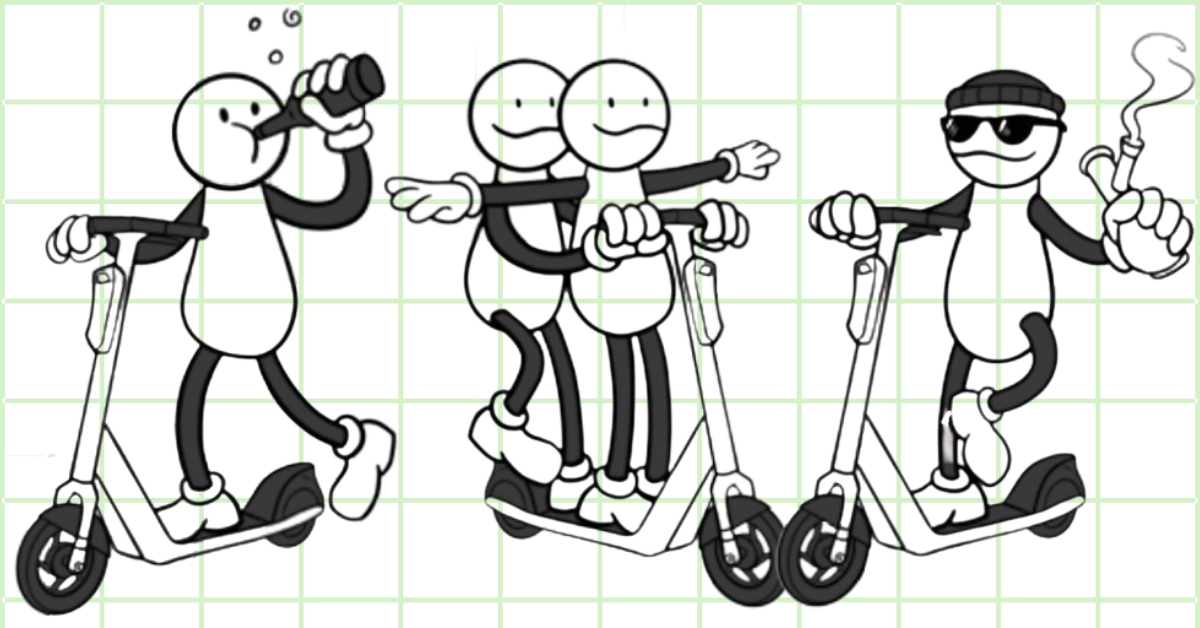More than one in four hospitalizations found to involve substance use
Shared e-scooters, like the ones from Lime and Bird, have become a big part of Edmonton’s summer patio culture. However, the devices have also become synonymous with danger and injury, according to Edmonton ER doctors.
It’s not uncommon for people on Whyte Avenue or Jasper Avenue to ride e-scooters while intoxicated, opting to avoid hefty Uber prices or driving their own motor vehicle (illegally). Driving e-scooters while drinking or high isn’t permitted in Edmonton, but it’s not something that is heavily policed, and it isn’t without serious risk.
A study from the University of Alberta’s injury prevention centre, conducted by a team of emergency medical physicians, saw nearly 759 initial emergency hospitalizations for e-scooter accidents between August 2019 and November 2021. In that study, 26 per cent of patients either tested or self-reported that they were intoxicated.
“It’s a big problem. It needs to be better regulated,”
Dr. Louis Francescutti, ER physician at Royal Alexandria Hospital
Dr. Erin Bristow, an ER doctor at the U of A Hospital and principal investigator for the study, says many of these injuries were quite severe. Facial smashes, broken wrists, and both major and minor head injuries were all common sights after e-scooter accidents.
“These are life-changing injuries. If you fall off your e-scooter and smash out your front teeth — that has huge financial implications for someone who might be a university student with limited dental coverage,” says Bristow.
Helmet use was “almost non-existent,” with only 2.4 per cent of patients reporting they wore one, and nearly 30 per cent of patients required some follow-up after the injury, with 9 per cent requiring surgery within 30 days.
“Anecdotally, you just see people have their life changed in a single night.”
While there wasn’t funding for the Injury Prevention Centre’s 2021 study to continue, and the city decreased the max speed and number of shared e-scooters, doctors are still reporting large swaths of injuries in Edmonton emergency rooms.
“These are life-changing injuries. If you fall off your e-scooter and smash out your front teeth — that has huge financial implications for someone who might be a university student with limited dental coverage,”
Dr. Bristow, ER Doctor at the University of Alberta Hospital
In 2019, Dr. Louis Francescutti, an ER doctor at the Royal Alexandria Hospital and professor at the school of public health at the U of A, predicted that e-scooters would put pressure on the healthcare system due to an influx of injuries.
Now, in 2024, Francescutti is saying his prediction is correct, as he still sees roughly one patient every week while e-scooters are operating. He’s sure it’s just a matter of one or two seasons before there is a fatality.
“It’s a big problem. It needs to be better regulated.”
For Francescutti, the key to improving the health-care system is eliminating the patient. He’s talking about preventative medicine reducing the number of injuries and the amount of money bleeding out of AHS.
According to AHS’s Injury, Prevention, and Control centre (IPC), injuries alone cost Albertans $7.1 billion every year.
Both Francescutti and Bristow don’t think e-scooters are the problem. They agree that they are a great way to get around the city and help bring vibrancy into Edmonton’s urban centres, but there seems to be a lack of compliance with the rules. Bristow says risk needs to be balanced with injury prevention.
“Legislation without enforcement is just window dressing,” Francescutti says.
Danielle Forbes, a spokesperson for the city, said in an email to the Griff that peace officers keep an eye on e-scooters and e-bikes as part of their existing patrols — handing out tickets and warnings when needed. But rather than ticketing, they focus on education.
“Legislation without enforcement is just window dressing,”
Dr. Francescutti
Despite the frequency of injuries, intoxication, and many people riding on sidewalks where e-scooters aren’t permitted, the city says peace officers didn’t hand out any tickets for bylaw infractions related to e-scooters in 2022 and 2023, and gave only one formal warning.
Forbes says that with technological advancements, the city plans to incorporate real-time data obtained from shared e-scooters and e-bikes in the upcoming season to oversee non-compliance.
In 2023, there were 1,980 e-scooters and 420 e-bikes licensed to operate in Edmonton. Contracts with micro-mobility vendors Bird and Lime expired at the end of last year, and the city is currently accepting proposals from vendors for the 2024 season.
Since pilot programs for shared e-scooters started popping up in major metropolises over the past five years, many former micro-mobility meccas have since dropped their e-scooter programs.
Montreal stopped its pilot program in 2020 but only recently resumed its use, restricting it to only Parc Jean-Drapeau. Paris, one of the former e-scooter capitals of the world, overwhelmingly banned the devices after 90 per cent of the 8 percent of eligible voters who showed up voted no.
Toronto still doesn’t have a shared e-scooter program, but Vancouver is looking to kick off its first one this summer.
Despite the expired contracts and bankruptcy at Bird, the micro-mobility companies and the city are both intent on keeping shared e-scooters in the Edmonton market.
Graphics by Shelby Mandin





0 Comments